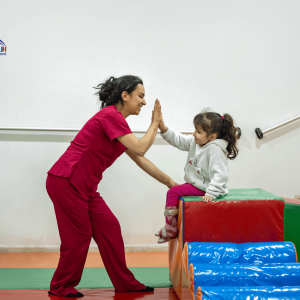Top 10 Signs Your Child Might Need Occupational Therapy

Top 10 Signs Your Child Might Need Occupational Therapy
Every child develops at their own unique pace, but sometimes, you might notice certain behaviours or difficulties that stand out. Occupational therapy (OT) helps kids facing challenges with daily activities, sensory processing, or motor skills.
But how do you know if your child might need this kind of support? If your child experiences frustration with tasks like dressing themselves, struggles with coordination during playtime, or avoids certain textures due to sensory overload, it might be time to consider occupational therapy. In this article, we will explore the top 10 signs that might indicate your child could benefit from occupational therapy in Dubai.
1. Difficulty with Fine Motor Skills
- Struggles with Writing and Drawing: does your child have trouble holding a pencil or using scissors? Fine motor skills involve the small muscles of the hands, which are essential for tasks like writing, drawing, and buttoning clothes. If your child avoids these activities or seems frustrated when doing them, it could be a sign they need occupational therapy.
- Trouble with Hand-Eye Coordination: Activities that require hand-eye coordination, such as catching a ball or threading beads, might be particularly challenging. If your child struggles significantly with these tasks, occupational therapy can help improve their coordination and dexterity.
2. Sensory Processing Issues
- Overly Sensitive to Sensory Stimuli: Some children are highly sensitive to sensory input. They might cover their ears at loud noises, be picky about clothing textures, or refuse to eat certain foods because of their texture. This hypersensitivity can interfere with daily activities and social interactions.
- Under-Responsive to Sensory Stimuli: On the flip side, some kids might be under-responsive and seek out intense sensory experiences. They might crash into things, chew on objects, or not notice when their hands or face are dirty. Occupational therapy can help these children learn to process sensory information more effectively.
3. Poor Gross Motor Skills
- Clumsiness and Poor Balance: If your child frequently trips, falls, or has difficulty with activities like jumping, climbing, or running, they might have poor gross motor skills. These skills involve the large muscles of the body and are crucial for overall physical coordination and movement.
- Difficulty with Sports and Physical Activities: Children with poor gross motor skills often avoid sports and physical activities because they find them challenging. Occupational therapy can help improve their muscle strength, coordination, and confidence in physical activities.
4. Challenges with Self-Care Skills
- Struggles with Dressing and Feeding: Self-care skills, such as dressing, feeding, and personal hygiene, are important for a child’s independence. If your child has difficulty with tasks like tying shoelaces, using utensils, or brushing their teeth, occupational therapy can provide strategies and exercises to build these skills.
- Reluctance to Engage in Self-Care: Sometimes, children might avoid self-care tasks because they find them too difficult or overwhelming. An occupational therapist can work with your child to make these activities more manageable and less stressful.
5. Difficulty with Social Interactions
- Struggles to Make Friends: Social skills are critical for building relationships and interacting with peers. If your child has difficulty making friends, understanding social cues, or participating in group activities, they might benefit from occupational therapy.
- Challenges in Group Settings: Children who struggle with social interactions might also find it hard to work in groups or follow classroom routines. Occupational therapy can help them develop the skills needed to navigate social situations and improve their interactions with others.
6. Behavioural Issue
- Frequent Tantrums and Meltdowns: Behavioural issues, such as frequent tantrums, meltdowns, or difficulty transitioning between activities, can be signs that a child is struggling with sensory processing or emotional regulation. Occupational therapy can help address the underlying causes of these behaviours and provide strategies for managing them.
- Difficulty Following Instructions: If your child has trouble following instructions or completing tasks, it might be due to underlying sensory or motor issues. An occupational therapist can work with your child to improve their ability to focus, follow directions, and complete tasks independently.
7. Academic Challenges
- Struggles with Schoolwork: Academic performance can be affected by fine motor skills, sensory processing, and attention issues. If your child has difficulty with tasks like writing, cutting, or staying focused in class, occupational therapy can help address these challenges.
- Avoidance of School-Related Tasks: Children who struggle with academic tasks might avoid homework or other school-related activities. Occupational therapy can provide strategies and tools to help your child engage more successfully with their schoolwork.
8. Problems with Play Skills
- Difficulty Engaging in Age-Appropriate Play: Play is essential for a child’s development, and difficulty engaging in age-appropriate play can be a sign of underlying issues. If your child struggles with imaginative play, problem-solving, or interacting with toys in a typical manner, occupational therapy can help.
- Limited Play Interests: Some children have a very limited range of play interests or repetitive play patterns. Occupational therapy can introduce new play activities and encourage a broader range of interests and skills.
9. Emotional Regulation Issues
- Difficulty Managing Emotions: Emotional regulation is crucial for a child’s well-being and social interactions. If your child has difficulty managing their emotions, frequently becomes overwhelmed, or has intense reactions to minor frustrations, occupational therapy can provide strategies to help them cope.
- Anxiety and Stress: Children with sensory processing or motor issues might experience higher levels of anxiety and stress. Occupational therapy can help identify triggers and develop coping mechanisms to reduce anxiety and improve emotional regulation.
10. Lack of Independence
- Reliance on Adults for Simple Tasks: If your child relies heavily on adults for tasks they should be able to do independently, it might be a sign that they need occupational therapy. Encouraging independence in daily activities is a key focus of occupational therapy.
- Avoidance of Independent Activities: Children who avoid independent activities might do so because they find them too challenging. Occupational therapy can build their confidence and skills, making them more willing to try new things on their own.
Beyond the Signs: When to Seek Professional Help

If you’re noticing several of these signs in your child, it’s wise to consult a qualified occupational therapist. Early intervention is key, and occupational therapy can make a significant difference in your child’s development and well-being.
You might ask, at what age should you consider your child developmentally behind? There are some general guidelines on when to consider professional help for different age ranges;
Infants and Toddlers (0-3 years)
- Developmental Delays: If a child is not meeting developmental milestones, such as sitting, crawling, walking, or speaking within the typical age range, it may be a sign they need early intervention.
- Feeding Difficulties: Trouble with breastfeeding, bottle feeding, transitioning to solid foods, or showing significant aversions to textures can indicate the need for occupational therapy.
- Sensory Processing Issues: Extreme reactions to sensory stimuli, such as loud noises, bright lights, or different textures, might necessitate early intervention.
Preschool Age (3-5 years)
- Fine Motor Skill Delays: Difficulty with tasks such as holding a crayon, drawing shapes, or using scissors can be indicators.
- Self-Care Skills: Challenges with dressing, brushing teeth, or feeding themselves.
- Play Skills: Limited play skills or difficulties engaging in age-appropriate play activities.
School Age (5-12 years)
- Academic Performance: Struggles with writing, cutting with scissors, or using classroom tools.
- Social Skills: Difficulty interacting with peers, following classroom routines, or engaging in group activities.
- Behavioural Issues: Frequent tantrums, meltdowns, or trouble transitioning between activities.
Adolescents (12+ years)
- Independence in Daily Activities: Difficulty with self-care tasks, organization, or time management.
- Social and Emotional Regulation: Problems with managing emotions, anxiety, or social interactions.
Conclusion
Occupational therapy isn’t about forcing children into rigid molds. It’s about celebrating their unique strengths and equipping them with the tools they need to reach their full potential.
Recognizing the signs that your child might need occupational therapy is the first step toward getting them the support they need. Occupational therapy offers a range of services to help children develop essential skills for daily life, from fine motor skills to social interactions.
If you notice any of these signs in your child, consider consulting with a qualified occupational therapist to discuss your concerns and explore the best options for your child’s development.
By addressing these challenges early on, you can help your child thrive and reach their full potential. Remember, every child is unique, and seeking help is a positive step toward ensuring their well-being and success.
